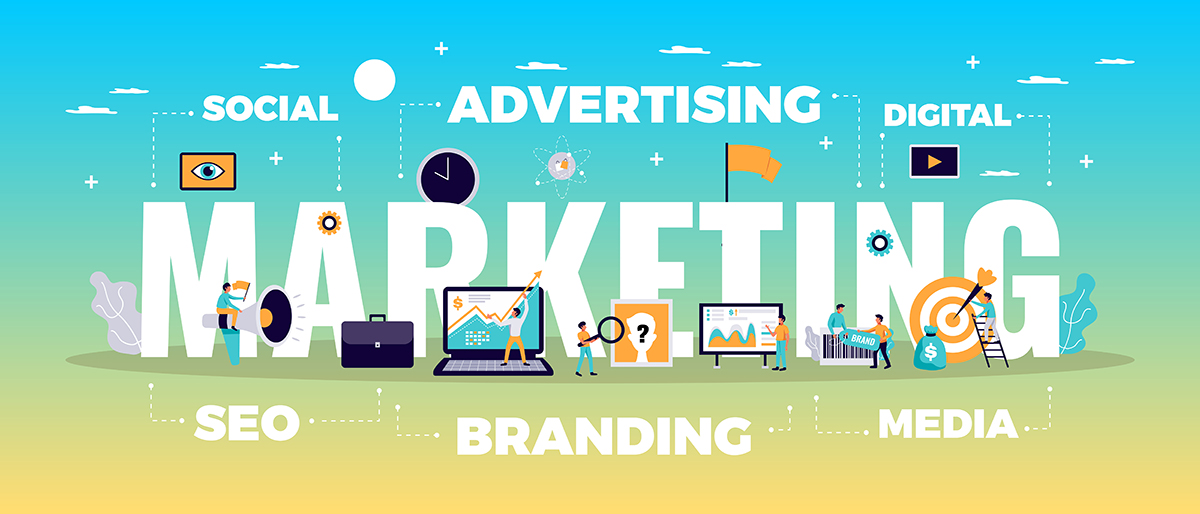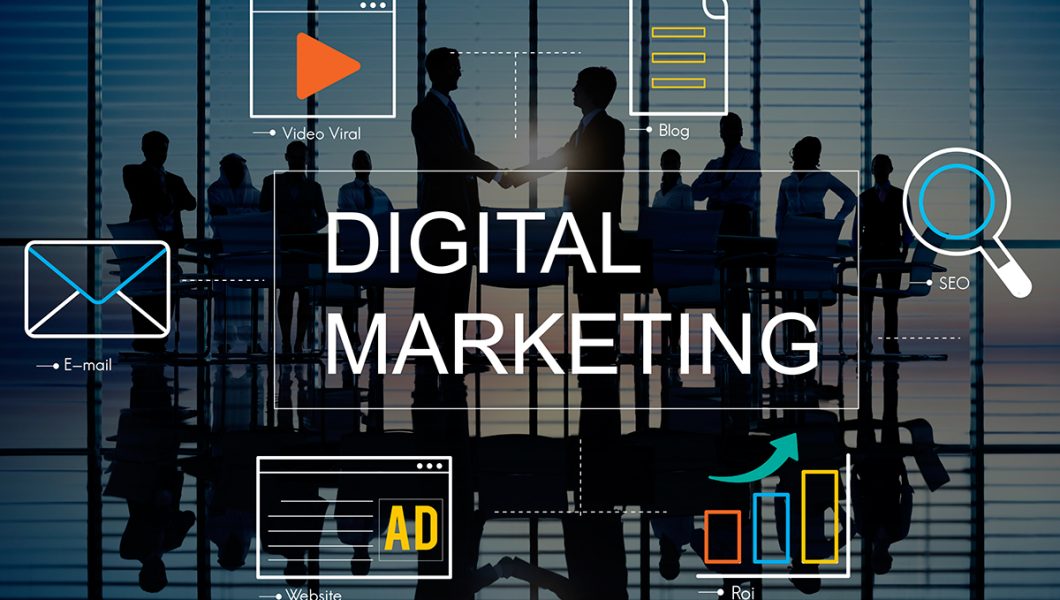Digital marketing refers to the use of digital channels, platforms, and technologies to promote products, services, and brands to reach and engage with a targeted audience. It encompasses various online marketing strategies and tactics aimed at driving awareness, generating leads, and ultimately converting prospects into customers.
Digital marketing leverages the internet and electronic devices to deliver marketing messages and advertisements to consumers. It includes a wide range of techniques and channels, such as:

- Search Engine Optimization (SEO): Optimizing websites and content to improve search engine rankings and organic visibility, driving more traffic and increasing online visibility.
- Search Engine Marketing (SEM): Running paid advertising campaigns on search engines like Google through pay-per-click (PPC) ads to increase visibility and drive targeted traffic.
- Social Media Marketing: Promoting products or services through social media platforms like Facebook, Instagram, Twitter, LinkedIn, and others to engage with the audience, build brand awareness, and drive conversions.
- Content Marketing: Creating and distributing valuable and relevant content (such as blog posts, articles, videos, infographics) to attract and engage the target audience, establish thought leadership, and drive customer action.
- Email Marketing: Sending targeted emails to a database of subscribers to nurture leads, build relationships, and drive conversions.
- Influencer Marketing: Collaborating with influential individuals on social media who have a large following to promote products or services and reach their audience.
- Affiliate Marketing: Partnering with affiliates who promote your products or services and earn a commission for each sale or lead they generate.
- Display Advertising: Placing visual advertisements on websites, mobile apps, or other digital platforms to increase brand exposure and drive traffic.
- Mobile Marketing: Optimizing marketing efforts for mobile devices, including mobile-friendly websites, mobile apps, and mobile advertising.
- Remarketing/Retargeting: Displaying targeted ads to people who have previously visited your website or engaged with your brand to remind and encourage them to return and convert.
- Analytics and Data-driven Marketing: Utilizing data analytics tools and metrics to track and measure marketing performance, make data-informed decisions, and optimize campaigns for better results.
Digital marketing provides businesses with a wide range of tools and tactics to effectively target, engage, and convert their audience. It allows for precise targeting, real-time data analysis, and the ability to adjust marketing strategies on the fly. The ultimate goal of digital marketing is to drive business growth, increase brand visibility, and achieve marketing objectives in the digital landscape.
Why to important digital marketing for business?
Digital marketing is crucial for businesses for several reasons. Here are some key points explaining why digital marketing is important:
- Wider reach: Digital marketing allows businesses to reach a vast audience globally. With billions of people using the internet, businesses can target and connect with their potential customers more effectively. Through various digital channels such as search engines, social media, email marketing, and websites, businesses can expand their reach and visibility.
- Cost-effective: Compared to traditional marketing methods like TV advertisements or print media, digital marketing is generally more affordable, especially for small and medium-sized businesses. There are numerous digital marketing techniques available that can fit different budgets, allowing businesses to allocate resources efficiently.
- Targeted audience: Digital marketing enables businesses to target specific demographics, interests, behaviors, and locations. This level of targeting ensures that marketing efforts are directed at the right audience who are more likely to be interested in the products or services being offered. By reaching the right people, businesses can achieve higher conversion rates and better return on investment (ROI).
- Measurable results: One of the significant advantages of digital marketing is the ability to track and measure its results in real-time. With various analytics tools, businesses can monitor their marketing campaigns’ performance, track website traffic, engagement levels, conversion rates, and more. This data allows businesses to make data-driven decisions, optimize their strategies, and achieve better results over time.
- Brand building and customer engagement: Digital marketing provides businesses with a platform to establish and strengthen their brand presence. By creating engaging content, interacting with customers on social media, and providing valuable information, businesses can build brand awareness, loyalty, and credibility. Regular communication with customers through digital channels also allows for better customer engagement and relationship building.
- Flexibility and adaptability: Digital marketing offers flexibility in terms of campaign duration, content creation, and budget allocation. It allows businesses to quickly adapt their marketing strategies based on real-time feedback and market trends. If a particular marketing approach is not yielding the desired results, businesses can easily modify or switch to alternative strategies without significant costs or delays.
- Competitive advantage: In today’s digital age, businesses that do not embrace digital marketing may be left behind by their competitors. Implementing an effective digital marketing strategy can give businesses a competitive edge, enabling them to stand out in the crowded marketplace, attract more customers, and grow their market share.
In summary, digital marketing is essential for businesses as it offers a wide reach, cost-effectiveness, targeted audience, measurable results, brand building opportunities, customer engagement, flexibility, and a competitive advantage. By leveraging the power of digital marketing, businesses can connect with their audience, drive growth, and achieve their marketing goals more effectively.






No Comments